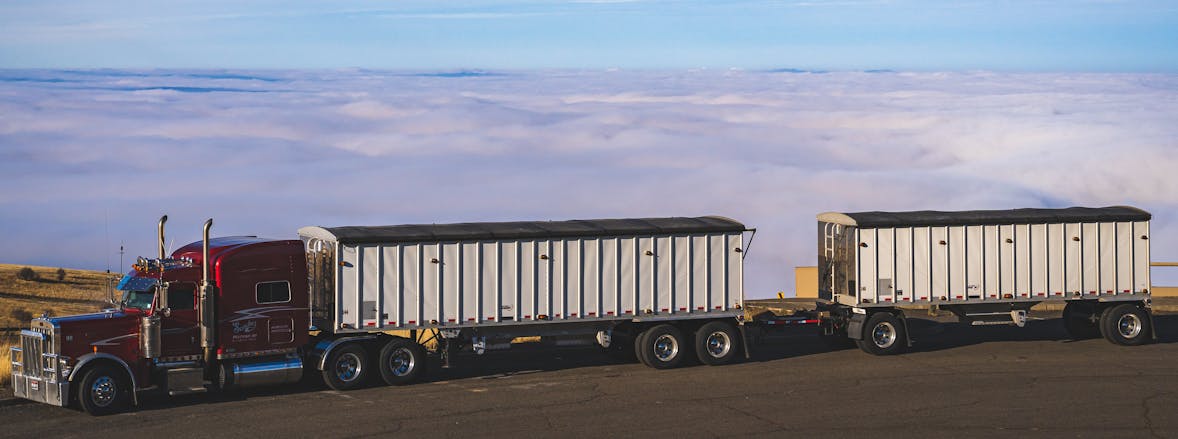As you look at where to buy salvage trailers, there are many important things to keep in mind that can help make the process easier and more efficient. Purchasing trailer salvage can save you a lot of money. However, if you don’t take the time to research your options, then you could find yourself with the wrong trailer for your needs.
Semi vs. Full Trailers
As you explore the options available for salvage trailers, you will come across two types of trailers: semi-trailer and full trailer. A semi-trailer refers to a commercial trailer with no front axle. Instead, it has its front weight supported by a towing vehicle- usually a semi-truck. There are numerous styles of semi-trailers, but the most common are:
A full trailer has both front and rear axles and is connected to a vehicle with a drawbar. Commercial freight trailers are usually 40 feet long and can move vertically with the hauling unit. Full trailers are permanently attached to their towing vehicles and can’t be detached easily. They are mostly used by businesses that have to make deliveries to multiple locations.
Find the Right Online Auction Site
The first step to buying trailer salvage is finding the right online auction site. While many online auction sites sell trailer salvage, be sure to find one that fits your needs and what you’re looking for. Some of the most important factors when choosing where to buy a damaged trailer is finding a site that offers reliable customer service, fair rates, and is licensed and insured. To find the best online auction, take the time to research multiple auction sites and compare them to one another. This can include reading customer reviews and having introductory conversations to get to know their salvage team. This will give you a good idea of what online auction site you want to buy from and the ones you don’t want to buy from.
Know What You Need
Salvage trailers can range in what they can do as far as work, hauling, and more. So, before purchasing a trailer be sure to match your needs with the trailer’s functionality. Consider the following questions when assessing your needs:
For example, flatbeds are best for bulk loads and stackable cargo that can be easily loaded from the side. However, this type of trailer is not good for cargo that needs to be protected from the elements. However, if you have cargo that needs to be protected, reefer trailers can do the job. Reefers offer additional functionality as they are temperature controlled, but this additional functionality can come at a cost. Reefers require more maintenance than a flatbed and have higher fuel cost due to the refrigeration unit on the trailer.
Taking these factors and needs into consideration when buying trailer salvage can help you narrow down the types of trailers that you may want to look at as each trailer style offers its own unique pros and cons.
What to Check When Purchasing Trailer Salvage
Once you know the type of trailer salvage that you want to buy, there are a few things you should look for as you narrow down your search. Before you even begin your search, determine what you can afford. To help determine your budget, check to see what the average price range is for the type of trailer you are looking for. This not only saves you time from looking outside your budget, but can help ensure you’re not letting others determine your budget for you.
When you have established your budget, you’ll want to perform compatibility and a background check on your potential trailer. One of the most important factors in buying salvage trailers is ensuring that your trailer is compatible with your truck. After determining compatibility, you will want to check any service and accident records to get the full history of the trailer. This allows you to have a full picture of any potential replacement costs and the current condition of the trailer.
Additionally, you will also want to check the structural components of the trailer. Most online auctions offer pictures and reports on the state of the truck, so be sure to pay close attention to detail when viewing them. If you do get the chance to inspect the trailer before you buy, create a checklist of things you want to inspect. Be sure to check for any rust and cracks on the trailer as well as the condition of the brakes, drums, lining, ABS, lights, electrical, and tires. Knowing the condition of the trailer will help you understand approximately how much money you will have to put into the replacement cost and, in turn, give you better negotiating power when it comes time to buy the trailer.
Buy with Heavy Salvage
Buying trailer salvage can seem overwhelming at first, but with the right resources and support from a team you can trust, the process is much easier. Heavy Salvage offers the industry’s most extensive listings of inventory. Through our nationwide pool of verified sellers and 24-hour customer service, we go to great lengths to ensure buying salvage is easy.

